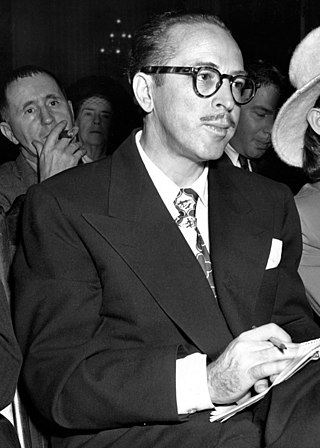
James Dalton Trumbo was an American screenwriter who scripted many award-winning films, including Roman Holiday (1953), Exodus, Spartacus, and Thirty Seconds Over Tokyo (1944). One of the Hollywood Ten, he refused to testify before the House Un-American Activities Committee (HUAC) in 1947 during the committee's investigation of alleged Communist influences in the motion picture industry.

Johnny Got His Gun is an anti-war novel written in 1938 by American novelist Dalton Trumbo and published in September 1939 by J. B. Lippincott. The novel won one of the early National Book Awards: the Most Original Book of 1939. A 1971 film adaptation was written and directed by Trumbo.

Kirk Douglas was an American actor and filmmaker. After an impoverished childhood, he made his film debut in The Strange Love of Martha Ivers (1946) with Barbara Stanwyck. Douglas soon developed into a leading box-office star throughout the 1950s, known for serious dramas, including westerns and war films. During his career, he appeared in more than 90 films and was known for his explosive acting style. He was named by the American Film Institute the 17th-greatest male star of Classic Hollywood cinema.
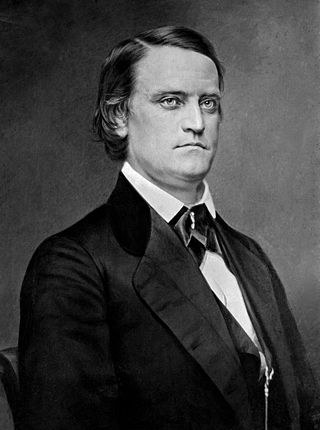
John Cabell Breckinridge was an American lawyer, politician, and soldier. He represented Kentucky in both houses of Congress and became the 14th and youngest-ever Vice President of the United States. Serving from 1857 to 1861, he took office at the age of 36. He was a member of the Democratic Party, and ran for president in 1860 as a Southern Democrat. He served in the U.S. Senate during the outbreak of the American Civil War, but was expelled after joining the Confederate Army. He was appointed Confederate Secretary of War in 1865.

Spartacus is a 1960 American epic historical drama film starring Kirk Douglas in the title role, a slave who leads a rebellion against Rome and the events of the Third Servile War. Adapted by Dalton Trumbo from Howard Fast's 1951 novel of the same title, the film was directed by Stanley Kubrick. In support of Douglas as Spartacus, the film stars Laurence Olivier as Roman general and politician Marcus Licinius Crassus, Charles Laughton as Sempronius Gracchus, Peter Ustinov as slave trader Lentulus Batiatus, and John Gavin as Julius Caesar. Jean Simmons played Spartacus' wife Varinia, a fictional character, and Tony Curtis played the fictional slave Antoninus.

Gunfight at the O.K. Corral is a 1957 American Western film starring Burt Lancaster as Wyatt Earp and Kirk Douglas as Doc Holliday, and loosely based on the actual event in 1881. The film was directed by John Sturges from a screenplay written by novelist Leon Uris. It was a remake of the 1939 film Frontier Marshall starring Randolph Scott, which was until 1957 the definitive film of the gunfight story.

Lonely Are the Brave is a 1962 American black and white Western film adaptation of the Edward Abbey novel The Brave Cowboy directed by David Miller from a screenplay by Dalton Trumbo and starring Kirk Douglas, Gena Rowlands and Walter Matthau.

Ty Hardin was an American actor best known as the star of the 1958 to 1962 ABC/Warner Bros. Western television series Bronco.
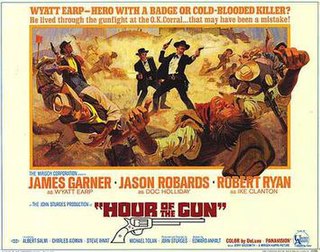
Hour of the Gun is a 1967 Western film depicting Wyatt Earp and Doc Holliday during their 1881 battles against Ike Clanton and his brothers in the Gunfight at the O.K. Corral, and the gunfight's aftermath in and around Tombstone, Arizona, starring James Garner as Earp, Jason Robards as Holliday, and Robert Ryan as Clanton. The film was directed by John Sturges.

Johnny Got His Gun is a 1971 American independent epic anti-war film written and directed by Dalton Trumbo, in his directorial debut, based on his 1938 novel of the same name. The film stars Timothy Bottoms, Kathy Fields, Marsha Hunt, Jason Robards, Donald Sutherland and Diane Varsi. It was Trumbo's first and only directorial effort.

Town Without Pity is a 1961 American/Swiss/West German international co-production drama film directed by Gottfried Reinhardt. Produced by The Mirisch Corporation, the film stars Kirk Douglas, Barbara Rütting, Christine Kaufmann, and E. G. Marshall.

Cowboy is a 1958 American Western film directed by Delmer Daves and starring Glenn Ford, Jack Lemmon, Anna Kashfi and Brian Donlevy. This film is an adaptation of the Frank Harris semi-autobiographical novel My Reminiscences as a Cowboy. Lemmon's character is based on Harris. The opening animated title sequence was created by Saul Bass. The screenwriters were Edmund H. North and Dalton Trumbo - the latter received no screen credit at the time because he had been blacklisted as one of the Hollywood Ten.

Last Train from Gun Hill is a 1959 American western film in VistaVision and Technicolor, directed by John Sturges. It stars Kirk Douglas, Anthony Quinn and Earl Holliman. Douglas and Holliman had previously appeared together in Sturges' Gunfight at the O.K. Corral (1957), which used much of the same crew.
For Love or Money is a 1963 romantic comedy film distributed by Universal International, produced by Robert Arthur, directed by Michael Gordon, and starring Kirk Douglas, Mitzi Gaynor, and Gig Young. It was written by Larry Markes and Michael Morris, and released on August 7, 1963. The supporting cast features Thelma Ritter, Julie Newmar and William Bendix.
Christopher Trumbo was an American television writer, screenwriter and playwright. Trumbo was considered an expert on the McCarthy-era Hollywood blacklist. His father, screenwriter Dalton Trumbo, was blacklisted by Hollywood for nearly a decade for refusing to testify to Congress, as one of a group known as The Hollywood Ten.

Colorado Sunset is a 1939 American Western film directed by George Sherman and starring Gene Autry, Smiley Burnette, and June Storey. Written by Betty Burbridge and Stanley Roberts, based on a story by Luci Ward and Jack Natteford, the film is about a singing cowboy and his buddies who discover that the ranch they bought is really a dairy farm—and worse, it's subject to intimidation from a protection racket that prevents dairy products from safely reaching the market.
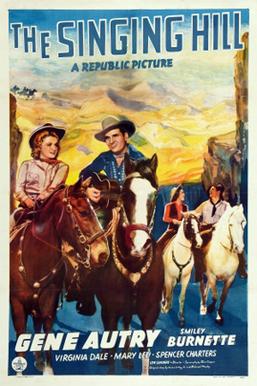
The Singing Hill is a 1941 American Western film directed by Lew Landers and starring Gene Autry, Smiley Burnette, and Virginia Dale. Based on a story by Jesse Lasky Jr. and Richard Murphy, the film is about a singing cowboy and foreman of a ranch that may be sold to an unscrupulous banker by the young madcap heiress who is unaware that the sale will result in the local ranchers losing their free grazing land and their ranches. In the film, Autry performed the 1940 song "Blueberry Hill", first recorded by Sammy Kaye, which would become a standard recorded by such artists as Louis Armstrong (1949), Fats Domino (1956), and Elvis Presley (1957). The song became one of Autry's best-selling recordings. In 1987, "Blueberry Hill" received an ASCAP Award for Most Performed Feature Film Standards on TV.

Trumbo is a 2015 American biographical drama film directed by Jay Roach and written by John McNamara. The film stars Bryan Cranston, Diane Lane, Helen Mirren, Louis C.K., Elle Fanning, John Goodman, Michael Stuhlbarg as Edward G. Robinson, Dean O'Gorman as Kirk Douglas, and David James Elliott as John Wayne. The film follows the life of Hollywood screenwriter Dalton Trumbo, and is based on the 1977 biography Dalton Trumbo by Bruce Alexander Cook.

Fred Aldrich was an American character actor of both film and television. Born in New York. He would break into the film industry in 1939, appearing in two films that year in small roles: My Son Is Guilty, and the notable, Confessions of a Nazi Spy, which starred Edward G. Robinson and George Sanders. In the course of his thirty-year career he would appear in over 170 films, in small and bit roles. With the advent of television, Aldrich would work in that medium as well, making his first small screen appearance on I Love Lucy, on which he would appear multiple times over the life of the series.
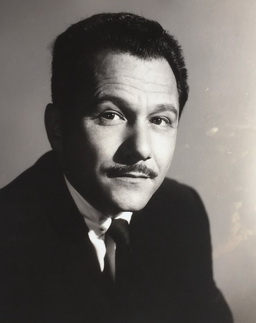
Edward Lewis was an American film producer and writer. As producer, he worked on nine films in partnership with actor Kirk Douglas; from 1958 to 1966, Lewis was Vice-President of Kirk Douglas film production company, Bryna Productions, as well as its subsidiaries, Brynaprod, Joel Productions and Douglas and Lewis Productions. He also produced nine films directed by John Frankenheimer. Lewis also wrote several books.
















